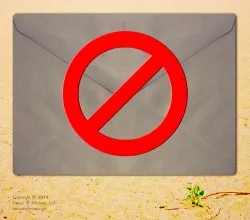Reducing Emails Excellent Leadership
Emails are one of the three biggest time wasters in business. Reducing emails though is simple and cheap. It begins and ends with leaders.
Last year, the research cited in “To Reduce E-mail, Start at the Top” (Harvard Business Review, September 2013 edition) by Chris Brown, Andrew Killick, and Karen Renaud made the rounds. In a case study, simply reducing the executive team’s email output cascaded throughout the company. Their 54% reduction translated into a 64% reduction by employees. The time savings equated to a 7% increase in productivity.
The solution is cheap. Only leaders need to seek help. In the study, employees required no help. They needed neither training nor tracking software. They received fewer emails from their bosses requesting updates, information or follow up unless it was really critical.
Emotionally, we enjoy being busy. It triggers emotions of importance and security. It’s easy and seductive to make work, especially for others. Emails, especially responses to work we issue, tap our most basic reward centers. Yet, they are empty calories. They yield many wasteful activities.
In addition to being cheap, simple and productive, reducing emails helps leaders have more effective relationships. In the study, leaders used alternate communications forms such as phone and in-person. These are more effective relationship-building modes.
Better relationships make better teams and business cultures. Better cultures make better implementation of visions, strategies and processes. They are the secret to change. Successful change is directly correlated to the strength of relationships between management and employees.
Looking at emails from these perspectives, reducing emails is excellent leadership. It’s excellent management. The only obstacle is what lies between leaders’ ears. It’s difficult to see one small email as a problem.
One time our ceiling collapsed. Water came cascading down. Tracing it back, our plumber found a small hole above our shower head. It was so small we never noticed it. As water splashed off our heads and shoulders, drops also fell through this pin-sized hole. With no place to go, many drops had collected over months.
Humans prefer singular, big problems. They have difficulty tackling many, small ones. Emails are many and small. Reducing emails requires excellent leadership.



Thanks for raising this Mike. It’s a great example of how culture is set “top down”. An email heavy culture at International Power was quickly changed (and sustained) by tackling the problem at the top and resetting the culture.
Email is a great example because it snowballs. An email from the CEO at 10pm usually results in three people frantically working to get an answer back up the chain by 10am. Good leaders recognize that this is a problem and try and prevent it from happening.
Regards.
David Pethick
Co-Founder, http://leading.io
Thank you, David. I’m pleased to hear of your testimonial in support of this. You’re right about the snowball effect with emails. There is much scrambling.
I appreciate you stopping by and leaving your testimonial and support. ~Mike
I agree there are far too many emails. Being retired, I have no “leadership” emails that are critical but do get a few of importance. I believe strongly that cutting back on emails sent helps also to increase the likely value level of the ones that are sent – by anyone! May I suggest another good practice with emails: I have often received apparently very important emails from businesses or agencies, only to find out they were a hoax – with the organization telling me “We would never send any important information by email”; my suggestion would be that leaders announce that short-term requests will never be sent by email. Then leadership emails are informative or inquisitive but with no quick turnaround expected.
There are good uses for email; but introducing oneself to someone else is NOT one of them! Without access to body language or tone of voice, interpretation can go awry. Indeed, this is probably a good consideration for everyone to make when considering email!!!
My thinking: All this about email goes for texting as well. Face-to-face and even phone calls (no body language) are so much better!!!
You’re definitely right about many of your points, John. Thank you as always for your insights and examples. I appreciate them. ~Mike
From a data knowledge point of view, emails can create an skewed picture of a situation. Reply all, Sending all/some, reply some, or not even bothering to replying defeats the whole purpose of knowledge sharing. Better collaborative systems of sharing exist, where essential facts about a business are not contained within the body of an email and can be made available to all.
Very good point, Ralph. Do you have some systems you can recommend?
Nice to read about it. People want to feel busy and want to do a great job. Let’s do it. I personally replace status email with face-to-face meetings (or Skype status). It allows me to show others that give a status every day will not change a lot and I am able to do a great job without their emails asking for the status. It takes time and education (or culture change), but people are asking for status very often means they are afraid of something (or un-secure of something). Maybe the next conversation should be about that and forget the project status. It is hard, but after you understand `why` they are asking status email/report very often, the life is better and you will get less emails asking for status in your inbox for sure.
Thanks Mike to share this post.
Omar
You’re welcome, Omar. I appreciate you stopping by, visiting, commenting and leaving your insights. They make sense and are very positive, overcoming the problems mentioned in the post. Enjoy your new year.